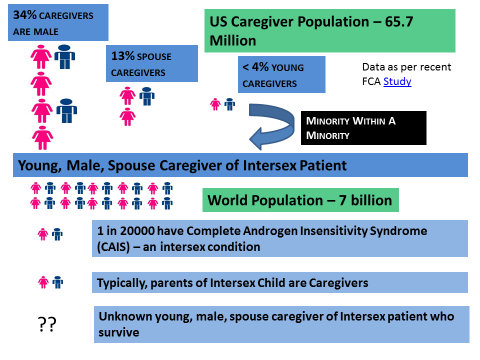 Someday we will all live in a world where truth is prevalent and respected.
Someday we will all live in a world where truth is prevalent and respected.
Intersex or Androgen Insensitivity Syndrome (AIS) is a condition that affects sexual development before birth and during puberty. People with this condition are genetically male. They may have female sex characteristics or signs of both male and female sexual development. It is well-documented that the treatment plan for AIS patients is part physical where a sex reassignment surgery(SRS) is needed to remove the male testes and subsequent Hormone Replacement Therapy (HRT). In addition, the treatment plan also calls for psychosocial counseling for severe trauma and crisis issues. There is secrecy and stigma issues which hold back the information from being shared and thus help is scarce. There are some reports available on LGBT caregivers geared towards issues of elder LGBT caregivers and even they cite lack of data and secrecy issues. Little information is available for young, male, spousal caregiver of LGBTI. When the secrecy and stigma are overcome and we can freely discuss Intersex care, an inclusive approach including palliative care for intersex patients and family will be available.
- Respect and Dignity – Commit yourself as a caregiver to show respect and dignity for all humans. In the unfortunate event you have been lied to as a caregiver, find support for yourself but continue to show respect and dignity for the patient.
- Patience – When someone undergoing SRS and HRT as an Intersex patient behaves badly or becomes unruly or threatens. Never see their behavior as a personal attack. As a caregiver, you must understand that occasionally they have no control over their own emotions.
- Love – Remember when the person was healthy and vibrant, full of life, love and laughter--treat them like you would treat them if they were not undergoing treatment for Intersex. As per a recent study by Fred Hutchison Cancer Research Center, women are 6 times more likely to be divorced or separated when diagnosed with a major illness. You stayed on as a caregiver. There is always hope after the treatment stabilizes, try to look ahead for the good days.
- Doctor Visits – If your loved one, the Intersex patient asks you to go with them to the doctor’s visits, make sure you have the prior approval of the doctor. It may be prudent to research the doctors before beginning treatment so that there is no disappointment later on and lack of support issues do not arise. You can help the Intersex patient by learning about different treatment approaches and ensuring the health care provider respects a patient centered approach.
- Secrecy – The patient and their ecosystem including medical professionals may demand secrecy. Even though, as a normal human being and as a caregiver you may be in shock, learn to deal with the secrecy and lying. It is part of easing the traumatic condition of the Intersex patient.
- Science and Medicine Help – Intersex is a rare medical condition. It is even more rare to have a spouse as a caregiver of an intersex person and very scant data is available. There are no scientific studies or research available on this rarest of rare situation. The secrecy and stigma only compound the problem by people not speaking up. Your experience as a young, male, spousal caregiver of Intersex patient while very rare is real contrary to popular belief now. Be sure to take care of yourself or you may have long term health needs of your own. Like Galileo observed, the earth is not the center of the universe contrary to popular belief at the time. Eventually, science and society will recognize your needs as a caregiver and as a patient because it’s the truth.
- Intimacy – It may be difficult to have intimacy with your loved one while undergoing treatment due to the wild emotions and the physical limitations at times. Work through these issues with patience and understanding while keeping in mind the behavior of the patient is not a personal attack.
- Caregiver Respite – The Intersex patient is most important. Everyone involved wants secrecy and by recognizing the caregiver, the ultimate secret may be outed. Will be difficult to get respite unless someone else in the know or in the family steps up.
Imagine a different medical condition like Alzheimer’s. While there is no known cure, the best cure is to rejoice the moments. There is a lot of information and resources and support groups for caregivers of Alzheimer’s. The inclusive approach makes the experience so much better both for the caregivers and the patients. Isn’t truth the best way for all caregiver-patient relationships regardless of the medical condition?
Someday we will all live in a world where truth is prevalent and respected. Are we there yet?





 Facebook
Facebook GooglePlus
GooglePlus RSS
RSS Twitter
Twitter